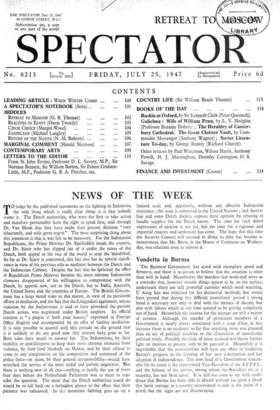NEWS OF THE WEEK
TO judge by the published statements on the fighting in Indonesia, the only thing which is really clear about it is that nobody wants it. The Dutch authorities, who were the first to take action and therefore presumably have the right to speak first, said through Dr. Van Mook that they have made their present decision " very reluctantly, and with great regret." The most surprising thing about this statement is that it was felt to be necessary. For the Indonesian Republicans, the Prime Minister Dr. Sjarifuddin inside the country, and Dr. Sjarir who has slipped out of it under the noses of the Dutch, both appeal to the rest of the world to stop the bloodshed. So far as. Dr. Sjarir is concerned, this fact also has its special signifi- cance in view of his previous role as mediator between the Dutch and the Indonesian Cabinet. Despite the fact that he fprfeited the office of Republican Prime Minister because the more extreme Indonesian elements disapproved. of his willingness to compromise with the Dutch, he appeals now, not to the Dutch, but to India, Australia, the United States and the countries of Europe. The British Govern- ment has a large moral stake in this matter, in view of its persistent efforts at mediation, and the fact that the Linggadjati agreement, whose violation by the Indonesians is said to have provoked the present Dutch action, was negotiated under British auspices. Its official reaction is " a plague o' both your houses," expressed in Foreign Office English and accompanied by an offer of further mediation. It is only possible to quarrel with this attitude on the ground that it is unlikely to do any good now that matters have gone so far. Both sides have much to answer for. The Indonesians, by their inability or unwillingness to keep their more extreme elements from violence, by their food blockade on Medan, and by their refusal to come to any compromise on the composition and command of the police force—in short, by their general irresponsibility—would have stretched the nerves of the most stolid and patient negotiator. But there is nothing new in all this—nothing to justify the use of force four days before the Netherlands Parliament was to meet to con- sider the question. The most that the Dutch authorities could do would be to fall back on a forbidden phrase to the effect that their patience was exhausted. In the meantime fighting goes on on a
limited scale and, apparently, without any effective Indonesian resistance ; the issue is submitted to the United Nations ; and Austra- lian and some Dutch dockers express their opinion by refusing to handle supplies for the Dutch forces. The time for such direct expressions of opinion is not yet, but the time for a vigorous and impartial enquiry and settlement has come. The hope that this time the Security Council will succeed in doing its duty has become so monotonous that Mr. Bevin, in the House of Commons on Wednes- day, was reluctant even to express it.


































